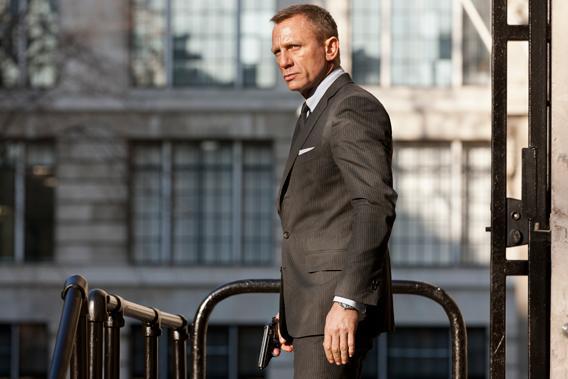Last autumn’s Skyfall, the 23rd of the 007 movies, brought a welcome change of mood to the decades-old spy franchise: It feels darker, more melancholy. Ben Whishaw’s new Q also struck a new note for the series—as did Javier Bardem, who, as the deliciously effete villain, managed to deliver more sex appeal than the latest Bond Girl. Less obvious, but no less important, was the introduction of a new composer to the series, which for the last 15 years has been single-handedly scored by David Arnold.
While moviegoers have mostly fixated on Adele’s delightfully bombastic theme song, it’s Thomas Newman’s fresh, inventive work on the rest of the film’s musical landscape that really gives a new sonic sheen to our beloved secret agent. Happily, the Academy acknowledged that work last week with an Oscar nomination. In a year rich with great scores from genres more often recognized for their music—e.g. fantasy and period pieces—Newman’s nod felt like a long-shot. But he deserves to win.
In fact, the only entry among the four other nominations that even approaches Newman’s is Mychael Danna’s gentle, shimmering score for Life of Pi. Danna’s sincere music floats and swirls around the fantastic story, providing flecks of vaguely Orientalist percussion, plucked strings, and vocal work; it’s great stuff and was rightly rewarded on Sunday night with the Golden Globe. (Skyfall was replaced on that otherwise identical docket by the lovely score for Cloud Atlas, which we explored here last year.)
Alexandre Desplat’s workmanlike Argo is catchy and appropriately suspenseful in its way, but feels half-hearted; Dario Marianelli’s charming, winking renovation of Russian Romantic music for Anna Karenina is lilting and lush, but not much more than a well-crafted exercise. Finally, there is, of course, the always expert John Williams, nominated this time for Lincoln. Williams brought a lighter touch than usual with this score—its syrupy brass, bird-like winds, and big, rolling, church-choir chords have a fresh-dew-on-the-morning-of-our-freedom quality. Shaker hymns, Negro spirituals, and Appalachian jigs show up in snatches. Having seen Lincoln twice, though, I don’t think the music features prominently enough to warrant the big prize.
So what makes Newman’s approach in Skyfall more worthy? Newman’s a long-time collaborator with director Sam Mendes, but pairing his musical voice with this particular film wasn’t an obvious choice. He’s known for iconic work on films like American Beauty, Wall-E, and, a personal favorite, Lemony Snicket’s A Series of Unfortunate Events, where his dark, quirky sensibility and uncommonly expansive musical vocabulary (especially with respect to instrumentation) brought those unique worlds to life. In pleasing opposition to his skill with playful recitative, Newman also has a penchant for tender arias—just listen to his heartbreaking theme from Meet Joe Black, for example.
These are all wonderful qualities in a composer, but not obviously the ones best-suited to a driving, muscular action movie. Yet somehow, in Skyfall, it works. Newman is clearly an aesthetic stranger to Bond-land, but this unfamiliarity allows him to hear it fresh and pull out new ideas. For example, his feline approach to action sequences—sleeker, more poised and restrained than the bravado that previous scores trafficked in—better suits a Bond hemmed in by bureaucracies and reliant on technology that has little to do with brute force. Newman applies a surgical touch to the classic Bond theme, extracting the uncertainty and even sadness of those tangy chords while leaving behind all the brash posturing. We know we are in a new era when the iconic two-chord punch violently drops into a much more tentative, roiling texture in Newman’s opening cue.
But what recommends Newman’s Skyfall score most is the emotional affinity between the composer and the new Bond Mendes has given us: Both are fundamentally creatures of melancholy. Newman’s music shines most when it examines the peculiar beauty that can be found in the shadier, wandering moments of life. Adrift in a baffling world that deems him no longer necessary, Bond now travels in on similar roads. The two are a match made in purgatory.
Newman also deserves the award this year because he’s been wandering those roads for a very long time. He is currently the most nominated living composer to have never won an Oscar, with 11 nominations. When Adele takes home the Oscar for best song in February, let’s hope Skyfall’s other musical genius finally gets recognized as well.
